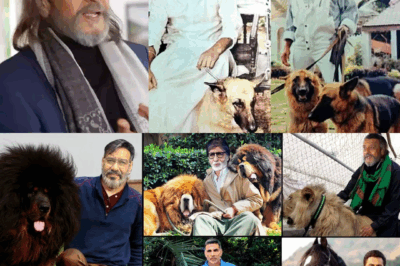It was a revelation that no one saw coming. In an industry where celebrities often showcase their family life in the brightest of lights, Rubina Dilaik and Abhinav Shukla chose to share a truth that left fans stunned — their beloved twin daughters, Jeeva and Aeda, are living 2000 kilometers away from them. And it’s not because of scandal or separation, but a decision born out of love, responsibility, and, unexpectedly, financial necessity.
The beloved television couple, adored for their on-screen charm and off-screen chemistry, opened up in a recent interview about why they made such a difficult choice. Sitting side by side, their eyes revealing both pride and pain, Rubina and Abhinav laid bare a chapter of their lives that they had kept close to their hearts for over a year.
For fans who have followed their journey, Rubina and Abhinav have always been fiercely private when it comes to their children. Since the birth of their twins in late 2022, they’ve kept the little girls away from the relentless glare of the entertainment world. No paparazzi shots, no magazine covers, and almost no social media appearances. But while many assumed this was purely to protect their children from the spotlight, the truth was far more complex.
“People think we’re keeping them away just to protect their privacy,” Rubina began softly, “but there’s more to it. We made a conscious decision to let them grow up in a safe, peaceful environment. And yes… part of it is because we need to work, we need to earn.” Her voice trembled slightly as she uttered those words, revealing the weight of the choice.
The couple’s daughters now live in Shimla, in the serene hills of Himachal Pradesh, under the loving care of Rubina’s parents. For most of the year, the girls enjoy the open air, the green fields, and the warmth of their grandparents — far from the hustle and noise of Mumbai’s film sets. But that distance comes at an emotional cost that only the couple truly understands.
Abhinav, always the more reserved of the two, admitted that it was one of the toughest decisions they’ve ever made. “We didn’t want them to be raised by nannies or strangers. If we had to be away because of work, we wanted them to be with family. But it also meant… we wouldn’t be there every morning when they wake up, or every night when they fall asleep.”
The logistics of this arrangement are anything but simple. The couple explained that they spend three nights a week with the girls whenever possible, flying to Shimla between shooting schedules. “It’s exhausting,” Rubina said with a bittersweet smile. “We land in the morning, play with them, feed them, put them to bed… and before we know it, we’re packing our bags again to return to Mumbai for work.”
And why work so hard? The answer was both practical and emotional. “We’ve lived through times when money was tight,” Abhinav shared. “We don’t want our daughters to ever feel that. We want to build something solid for their future — good education, security, opportunities.”
The truth is, behind the glamorous facade, the entertainment industry is unpredictable. Projects can get delayed, canceled, or change overnight. The couple knows the importance of seizing opportunities when they come, even if it means sacrificing time together as a family.
Yet, the physical distance is not the only challenge the couple has faced with their twins. In a candid admission that shocked many, Rubina revealed that her daughters have already experienced colorism at just one and a half years old. “It broke my heart,” she said. “One of them is slightly fairer, and the other has a warmer skin tone. Some relatives — and even strangers — have made comments. Can you imagine? They’re just babies.”
Her words struck a chord with many parents across India, where such biases still exist. Rubina’s decision to speak openly about it was not just personal but also a quiet act of defiance against societal norms. “I want them to grow up confident, proud of who they are, of their roots, of their individuality,” she said firmly.
Despite the challenges, there are moments that remind them why they made this choice. Rubina painted a picture of one such visit — the twins running barefoot on the grass, giggling as their grandfather taught them how to feed the chickens, their grandmother calling them inside for hot parathas. “Those moments,” she said, “are priceless. Mumbai can’t give them this kind of childhood.”
Abhinav agreed, adding that their daughters are already developing a deep bond with their grandparents, something he himself cherishes. “My in-laws have given them the same love and guidance they gave Rubina. That’s a blessing I can’t put a price on.”
Still, the ache of missing milestones is real. Rubina admitted she has missed their first steps, while Abhinav missed hearing one of their first words. “We try to capture everything on video and send it to each other, but it’s not the same as being there,” she confessed.
The couple’s story is a reminder that parenting in the modern world is often a balancing act — one where love sometimes means letting go in order to give more. They know critics will question their choice, but they’ve made peace with it. “It’s our journey,” Abhinav said. “And one day, when they’re old enough, we’ll tell them why we did it.”
For now, they continue their whirlwind routine — shooting in Mumbai, catching early flights to Shimla, and cherishing every hour they get with Jeeva and Aeda. “We don’t measure our time together in days,” Rubina said with a smile. “We measure it in hugs, in kisses, in bedtime stories.”
In the end, their story isn’t just about distance. It’s about redefining what it means to be present for your children, even when you can’t be there physically every moment. It’s about trusting family, valuing emotional security over material show, and embracing the fact that sometimes, the best way to love is to let your children bloom where they are safest.
Rubina and Abhinav’s revelation may have surprised many, but to those who understand the quiet sacrifices of parenthood, it is a powerful reminder: love is not always about holding close — sometimes, it’s about letting go.
And as the hills of Shimla echo with the laughter of two little girls, somewhere in Mumbai, their parents are smiling through the ache, counting down the days until they can hold them again.
News
Armaan Malik Under Fire as Courtroom Showdown Looms Over Four Marriage Claims
For years, Armaan Malik has been recognized for his charm, musical talent, and ability to connect with fans through soulful…
Why Jaya Bachchan is Outraged Over ‘Dhakka Kanda’ – Full Story Revealed
It began as a whisper, a murmur spreading across the entertainment industry. The term “Dhakka Kanda” had suddenly entered the…
TV Love Story Ends in Tears – Mayank & Hunar Announce Divorce After Nearly a Decade
It was a regular Tuesday morning for most people — but not for the fans of television actors Mayank and…
Sridevi’s Final Journey: The Heartbreaking Farewell That Felt Like a Wedding
August 13 is not just a date on the calendar for millions of Bollywood fans. It is a day that…
Mithun Chakraborty Leaves ₹45 Crore Fortune to His 116 Dogs – Fans Can’t Believe It
The story sounds like a plot from an emotional Bollywood film — a legendary actor, a sprawling farmhouse, and over…
TV’s Most Famous Villainess Reveals Her Painful Past and Shocking Escapes
Kamya Punjabi, the face millions recognize from television dramas, has lived a life that could rival the most intense soap…
End of content
No more pages to load












